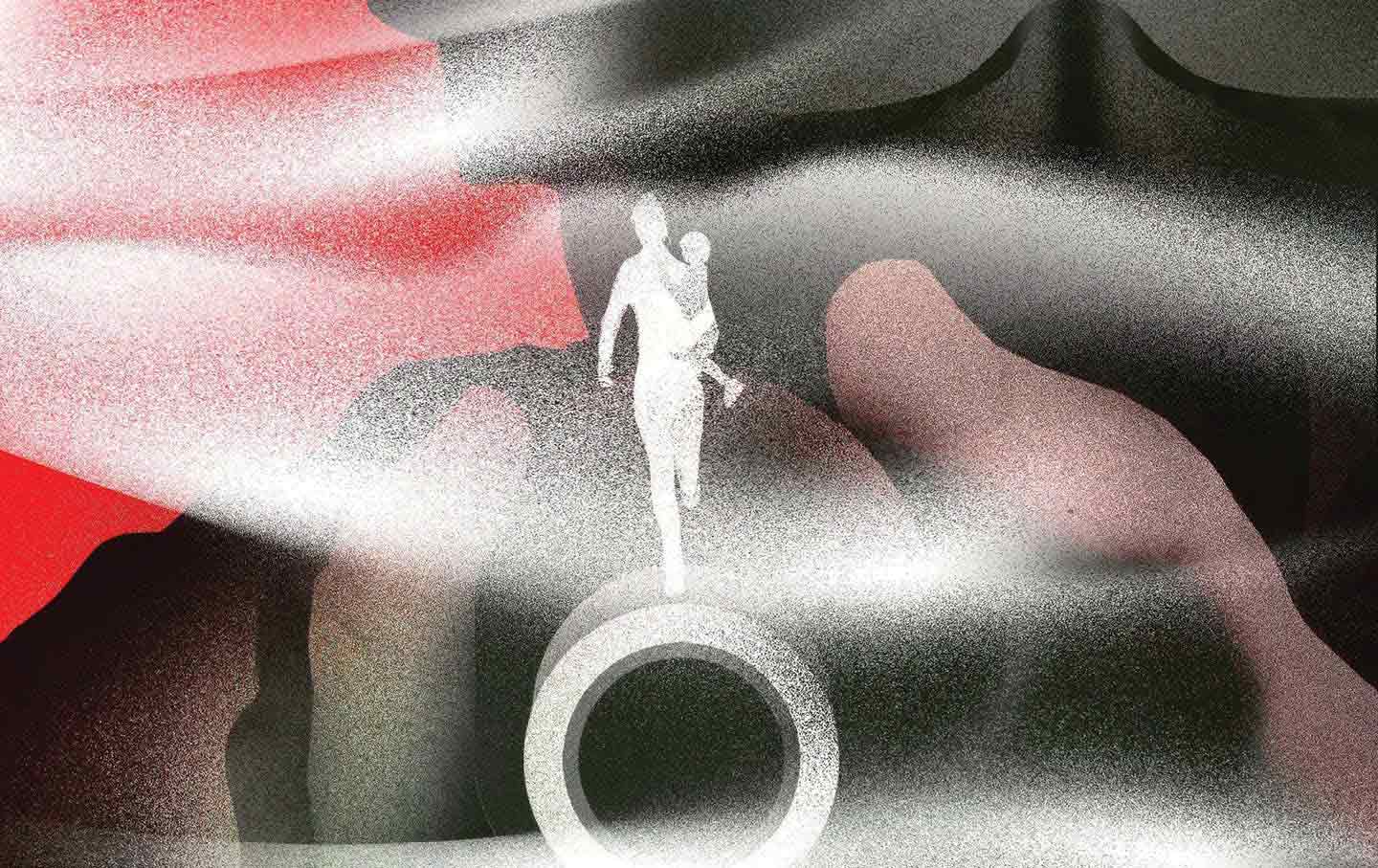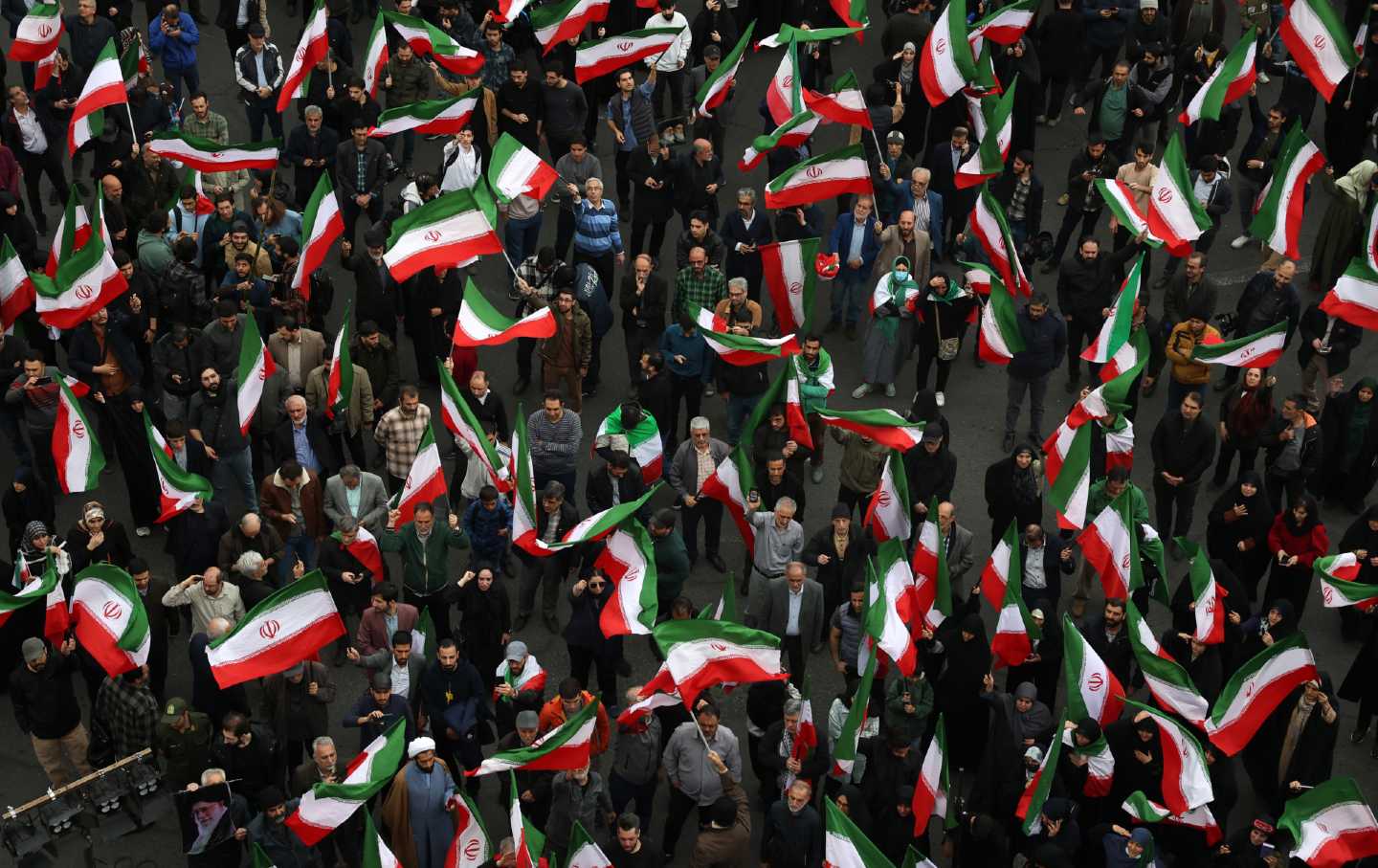Israel’s Repression of Palestinians Paved the Way for Its New Antidemocratic Court
The 56-year-long brutal occupation of the Palestinian Territories has come home to roost.

In Jerusalem on February 20, 2023, Israelis protest outside the Knesset, Israel’s parliament against plans by Prime Minister Benjamin Netanyahu’s new government to overhaul the judicial system.
(Ohad Zwigenberg / AP Photo)This article originally appeared at TomDispatch.com. To stay on top of important articles like these, sign up to receive the latest updates from TomDispatch.com.
On July 24, the Israeli Knesset passed a measure forbidding the country’s High Court of Justice from in any way checking the power of the government in making cabinet decisions or appointments, based on what’s known as the “reasonability” standard. In the Israeli context, this was an extreme act, since right-wing parliamentarians were defying massive crowds that had, for months on end, demonstrated with remarkable determination against such radical legislation. And that measure was only one part of a wide-ranging redesign of the court system unveiled by Prime Minister Benjamin Netanyahu in January, which deeply alarmed his critics.
As exemplified by prominent world historian Yuval Noah Harari, such protestors warned that limiting the functions of the highest court, in a land with a parliamentary system largely lacking other checks and balances, represented a big stride toward a future autocracy. After all, dangers abound in a nation with a one-chamber legislature, lacking the equivalent of a Senate, that elects the prime minister as the instrument of its will.
The central motivation for that legislation, however, lay not in domestic politics but in the desire of extremists in the cabinet to ensure that the courts won’t be able to interfere with their plans to vastly increase the number of Israeli squatter-settlements on Palestinian land on the West Bank and perhaps someday soon simply annex that occupied territory. Under such circumstances, members of the far-right Religious Zionist Party were recently excoriated by Tamir Pardo, a former head of Israeli intelligence, as Israel’s “Ku Klux Klan.”
Reasonability, Fraud, and Occupation
The Israeli Supreme Court had invoked what’s called “the reasonableness doctrine,” rooted in British common law, to strike down Netanyahu’s January appointment of Aryeh Makhlouf Deri as minister of health and the interior in his ever more extreme cabinet. Deri, a Moroccan-Israeli, leads the ultra-Orthodox Shas Party, largely comprised of Mizrahim, or Jews of Middle Eastern ancestry, like himself. Deri has often been in trouble with the law. He was, in fact, given a three-year jail sentence in 1999 for fraud and bribery. In 2022, he was facing a possible conviction for tax fraud by the High Court of Justice, which could have resulted in jail time and a seven-year ban on political activity. According to the justices of that court, Deri promised to retire from politics to avoid being sentenced, a vow on which he later reneged.
Netanyahu managed to keep Shas in his current coalition despite its loss of that important cabinet seat. Indeed, he still needs its support to stay in power. Over time, the Shas Party has swung far to the right on the Israeli political spectrum, while taking an ever-harder line in favor of expanding Jewish settlements in the Palestinian West Bank, which Israel seized in 1967. It is now inhabited by some 3 million stateless Palestinians whose land continues to be usurped. The Shas leadership has shifted to ever stronger support for Jewish settlements on the West Bank in large part because of the increasing proportion of Israeli squatters there who hail from the Haredim or Ultra-Orthodox religious tradition. They had already become about a third of all West Bank settlers by 2017.
In the Israeli system, the Ultra-Orthodox pay little in taxes, are subsidized to study the Bible, and are exempted from military service. Moreover, as a group, thanks to their tendency to have large families, they have grown to about 13 percent of the Israeli population. They place a substantial burden on the state, which, in recent years, has responded by giving them inexpensive housing on Palestinian land.
At the left-leaning +976 Magazine, journalist Ben Reiff recently pointed out that Minister of Justice Yariv Levin, a longtime factotum in Netanyahu’s Likud Party and a driving force behind the recent attack on the judiciary, justified his actions primarily in terms of the Palestine issue. He singled out High Court decisions that prevented the blackballing of individuals who supported the Boycott, Divestment, and Sanctions (BDS) on Israel movement for the country’s apartheid-style policies toward the Palestinians or who backed “refuseniks,” Israeli soldiers who decline to serve as part of an occupation force in the Palestinian West Bank. Levin also complained bitterly about court rulings requiring that Palestinians be treated in accord with the Geneva Conventions. One conclusion from Reiff’s reporting is that there will be ever more blackballing of critics of the occupation by the present government.
The High Court (Sometimes) Recognizes the Rights of Palestinians
Another step Netanyahu has said he would like to implement is to allow a simple majority in the Knesset to overrule any High Court rulings striking down legislation as inconsistent with the country’s basic laws on human rights, passed in the 1990s. Among the grievances of the particularly extremist Greater Israel faction in the cabinet is that court’s dependence on international law in some of its rulings against “Illegal settlements”—those established by militant vigilantes on West Bank land owned by Palestinian families for centuries.
Over the years, the High Court has, in fact, ruled in favor of numerous settlements, while drawing on aspects of Ottoman, British, and international law to do so. Ottoman law, for instance, permitted the state to assume ownership of fallow land. On that basis, the court has, in the past, allowed the Israeli state to declare swathes of the Palestinian West Bank “state land.” It mattered little that an occupying state settling its citizens on such territory gravely breached the Geneva Convention IV and the 2002 Rome Statute that acts as a charter for the International Criminal Court.
In other words, all such settlements should be illegal. Palestinians often protest, to no avail, that land designated by authorities in Tel Aviv as ownerless and fallow is, in fact, private property and has even been recently cultivated. Once it officially becomes state land, however, the court has indeed permitted Israeli citizens to build on it, which is how most Israeli settlements on the West Bank came to be. The court considers such Jewish-only housing projects “legal” under Israeli law.
Although those settlements on the West Bank are often depicted as a volunteer and private activity, the Israeli government has long provided subsidies and other incentives to people moving into such remarkably low-rent settlements and continues to do so to this day. Because so many Ultra-Orthodox men, with their limited educations (and incomes), are unemployed, they are especially open to such obvious opportunities.
Although once upon a time many illegal Israeli settlements were swiftly dismantled by the Israeli army, some survived and began lobbying the government for recognition. In 2017, the Knesset took a radical step, passing a law that allowed the Israeli state to expropriate Palestinian land at will and used that power to legalize 16 previously illegal squatter-settlements. In 2020, the High Court shocked Knesset right-wingers by striking down that very law and explicitly stating that Israeli sovereignty simply didn’t apply to West Bank Palestinians who were under occupation and must be treated in the context of international law on military occupations. The court even cited Article 27 of the Fourth Geneva Convention, which guarantees occupied persons respect for their dignity and family rights.
“Sovereignty and Settlement”
Popular
“swipe left below to view more authors”Swipe →That ruling, with its explicit denial of Israeli sovereignty over the Occupied Territories, proved a genuine shock to the political right and underlies its ongoing Knesset campaign to neuter the courts. Extremist Bezalel Smotrich, now both minister of finance and responsible for the Palestinian West Bank, was deeply angered by that High Court ruling. He insisted that the only acceptable response would be “passing the bill allowing the Knesset to override the courts immediately.” As it happens, his own home was built on private Palestinian land just outside the municipal limits of the “legal” settlement of Kedumim. The left-leaning Israeli newspaper Haaretz also reported in June 2020 that then-speaker of the Israeli parliament, Yariv Levin, lashed out, claiming the High Court had “once again today trampled, as is its unacceptable tradition, Israeli democracy and the basic human rights of many Israeli citizens.” As for Netanyahu, at the time he suggested that the problem of illegal settlements would best be resolved by a formal Israeli annexation of a large area of the Palestinian West Bank.
The way the High Court held that Israel has no sovereignty over the West Bank deeply offended the members of the extremist Religious Zionism bloc led by Smotrich, including its coalition partner, the Jewish Power Party led by extremist Itamar Ben-Gvir (who is now Israel’s minister of national security). Under the circumstances, you undoubtedly won’t be surprised to learn that their platform for the November 2022 parliamentary election centered on “sovereignty and settlement”—that is, sovereignty over and settlement of the Palestinian West Bank. Indeed, they claimed that Palestinian agricultural and building projects in their own villages were “expansionist” and vowed to act quickly to curtail them.
Having joined Netanyahu’s ruling coalition since that election, they have now acquired substantial power to pursue the goal of halting Palestinian economic life. Smotrich even called for a Palestinian village to be wiped off the map of the West Bank. Though he later backpedaled under pressure, the lawless extremity he and a significant part of Netanyahu’s coalition today represent should be all too obvious.
Given that the High Court stands in the way of such lawlessness, despite its own frequent betrayal of Palestinian rights, the extremists are determined to gut it. Significant numbers of those who responded to the recent mass demonstrations against Netanyahu’s court decision with counterdemonstrations were bussed in from the squatter-settlements, many of them Haredim.
The Imperiled Rights of Women, LGBTQ+, and Minorities in Israel
Although the right wing’s primary motivation for eviscerating the authority of the courts had to do with the urge to take fuller control of the Occupied Palestinian Territories, the changes already implemented and still contemplated by Prime Minister Netanyahu and crew have dire implications for all too many Israeli citizens as well. As a start, more than 20 percent of them are persons of Palestinian heritage. Think of them as Palestinian-Israelis (on the model of “Italian-Americans”), though they are called “Arab Israelis” in Hebrew. Some 60 laws and administrative decrees have already ensured that they remain second-class citizens. In 2018, in fact, the Knesset explicitly deprived them of “sovereignty,” reserving it for Jewish Israelis alone (while stripping Arabic of its previous designation as an “official language”).
Admittedly, on occasion, the High Court has ruled in favor of equal rights for Israelis of Palestinian heritage. It did, for instance, allow government funding of their religious communities and school administration. In most other instances, however, it repeatedly rebuffed their demands for equal treatment under the law, which helps explain why they have largely been absent from the enormous demonstrations that have shaken the country every week since January. Still, Palestinian-Israeli community activists are alarmed that the Knesset’s removal of court oversight when it comes to the reasonableness of administrative appointments could prove a carte blanche for far more active discrimination against Muslim and Christian Palestinian-Israelis.
Despite a distinct lack of concern for Palestinian rights, centrist and secular Jewish Israelis are in no doubt about the serious impact the Netanyahu government’s gutting of the judiciary could have on their lives. That explains why a quarter of the country has participated in those huge, ongoing demonstrations and 58 percent of all Israelis want the government to stop trying to curtail the power of the courts.
Haaretz reports that women fear such power could lead the present right-wing government to put authority over alimony and child support in the hands of all-male rabbinical courts, block the government from signing onto the Istanbul Convention for the Prevention of Violence against Women, and increase gender segregation at beaches, parks, and the Wailing Wall. It might even move to reduce any commitment to their very presence on governmental bodies.
Similarly, LGBTQ+ Israelis, who had, through their activism, secured ever more rights in Israel since the repeal of the country’s “sodomy laws” in 1988, feared that their freedoms might be reversed by the most homophobic government in the country’s history. That self-described “proud homophobe” Bezalel Smotrich typically supports a law that would exempt religious people from being charged with discrimination if they decline to provide a service on the basis of their religious beliefs.
Corruption
Although the rights of women, the LGBTQ+ community, and minorities are obviously on the line, another pressing concern for those protesting the limits being imposed on judicial authority is the growth of government corruption, which could have a striking impact on the country’s future. Netanyahu is already on trial for accepting bribes (a trial he’s tried to legislate away). He also wanted to make the notoriously corrupt Aryeh Makhlouf Deri his deputy prime minister and may now proceed with that plan.
A Netanyahu government unconstrained by the courts could engage in favoritism in contracts, licenses, and legislation of all sorts. The fear of such things has led 28 percent of Israelis, including a surprising number of young married professionals, to admit that they are at least considering leaving the country. Many claim that they fear that “the government is going to take their money.” Although 600,000 to a million Israelis are typically out of the country at any time, studying or working elsewhere, they usually do come home sooner or later. Now, however, relocation agencies report that such returns are plummeting. There has also been a 20 percent drop in immigration to Israel this year and that shortfall would undoubtedly be even more serious were it not for the Russian Jews fleeing their ever more unstable, war-embroiled country. Reuters reports that investors in the usually vibrant Israeli high-tech sector that accounts for about 14 percent of the country’s $500 billion gross domestic product are now keeping about 80 percent of their new start-ups abroad. Many tech companies have also moved both their bank accounts and some of their assets out of the country.
Meanwhile, the protests—with hundreds of thousands of people in the streets every Saturday evening—continue, with demonstrators experiencing increasing police brutality. Masked cops are arbitrarily beating them up and aiming water cannons at their heads, sometimes using “skunk water”—a putrid chemical that sticks to your clothing and skin—to disperse them.
Once upon a time, such tactics were honed to a kind of grim perfection to repress Palestinians on the West Bank. Now, the Israeli opposition is discovering that such brutalization of indigenous West Bank villagers has boomeranged and the government has begun to deal with them as it once did with stateless Palestinian demonstrators. Consider this the new Israeli reality: The 56-year-long brutal occupation of the Palestinian Territories has come home to roost, and Israel is now occupying itself.
More from The Nation

Garbage In, Carnage Out Garbage In, Carnage Out
The harrowing lessons of the Pentagon’s recently dissolved partnership with Anthropic.

The Iran War Could Be Catastrophic for the US-Israel Alliance. Good. The Iran War Could Be Catastrophic for the US-Israel Alliance. Good.
As Israel’s role in pushing the war with Iran comes into ever sharper focus, it’s up to us to turn outrage into change.

An Unlawful War An Unlawful War
The precedent being set by the US in launching this war of aggression against Iran will long live in infamy.

Trump and Netanyahu Want to Turn Iran Into a Failed State Trump and Netanyahu Want to Turn Iran Into a Failed State
This war looks designed to cause maximum chaos and instability. The world will pay a high price.

The War on Terror Paved the Way for Trump’s Rise—Now He’s Making It His Own The War on Terror Paved the Way for Trump’s Rise—Now He’s Making It His Own
Only the total abolition of the DHS can restore freedom.

The Iranian Voices America Isn’t Hearing The Iranian Voices America Isn’t Hearing
We need to listen to those who oppose both the Islamic Republic’s authoritarianism and foreign military escalation.


